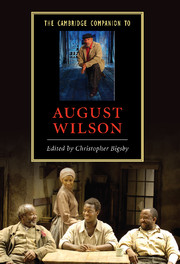Book contents
- Frontmatter
- 1 August Wilson: the ground on which he stood
- 2 Been here and gone
- 3 August Wilson’s relationship to black theatre: community, aesthetics, history and race
- 4 Music and mythology in August Wilson’s plays
- 5 Gem of the Ocean and the redemptive power of history
- 6 Joe Turner’s Come and Gone
- 7 Ma Rainey’s Black Bottom: cutting the historical record, dramatizing a blues CD
- 8 A piano and its history: family and transcending family
- 9 The tragedy of Seven Guitars
- 10 Safe at home?: August Wilson’s Fences
- 11 Two Trains Running: blood on the tracks
- 12 Jitney, folklore and responsibility
- 13 King Hedley II: in the midst of all this death
- 14 Radio Golf: the courage of his convictions - survival, success and spirituality
- 15 Critics on August Wilson
- 16 An interview with August Wilson
- Index
14 - Radio Golf: the courage of his convictions - survival, success and spirituality
Published online by Cambridge University Press: 28 January 2008
- Frontmatter
- 1 August Wilson: the ground on which he stood
- 2 Been here and gone
- 3 August Wilson’s relationship to black theatre: community, aesthetics, history and race
- 4 Music and mythology in August Wilson’s plays
- 5 Gem of the Ocean and the redemptive power of history
- 6 Joe Turner’s Come and Gone
- 7 Ma Rainey’s Black Bottom: cutting the historical record, dramatizing a blues CD
- 8 A piano and its history: family and transcending family
- 9 The tragedy of Seven Guitars
- 10 Safe at home?: August Wilson’s Fences
- 11 Two Trains Running: blood on the tracks
- 12 Jitney, folklore and responsibility
- 13 King Hedley II: in the midst of all this death
- 14 Radio Golf: the courage of his convictions - survival, success and spirituality
- 15 Critics on August Wilson
- 16 An interview with August Wilson
- Index
Summary
Hey, you have to go forward into the 21st century. I figure we could go forward united . . . I'm talking about the black Americans who share that 400-year history of being here in America. One of the things with Radio Golf is that I realized I had to in some way deal with the black middle class, which for the most part is not in the other nine plays. My idea was that the black middle class seems to be divorcing themselves from that community, making their fortune on their own without recognizing or acknowledging their connection to the larger community. And I thought: We have gained a lot of sophistication and expertise and resources, and we should be helping that community, which is completely devastated by drugs and crime and the social practices of the past hundred years of the country . . .
If you don't recognize that you have a duty and a responsibility, then obviously you won't do that. Some people don't feel that responsibility, but I do, so I thought I would express that in the work. In the 21st century we can go forward together. That was my idea behind the play.
Radio Golf (2005) is both August Wilson's Old Testament to the past and his New Testament to the future. Never one to mince words, even in the last few months of his life, he sounds his challenge to the black middle class to engage in the battle for the black man's soul.
Wilson selects a specific era out of the homogeneous course of history to illustrate a 'state of emergency' which Walter Benjamin in Illuminations (1969) calls the rule rather than the exception for those who subscribe to the tradition of the oppressed. Radio Golf depicts Pittsburgh's Hill District in 1997, a year which marks the critical moment of its possible extinction in the name of progress. As the city proceeds to rid itself of blight, it also creates a 'moment of danger' which affects both the historical content of the African American tradition and its receivers.
- Type
- Chapter
- Information
- The Cambridge Companion to August Wilson , pp. 183 - 192Publisher: Cambridge University PressPrint publication year: 2007
- 1
- Cited by

